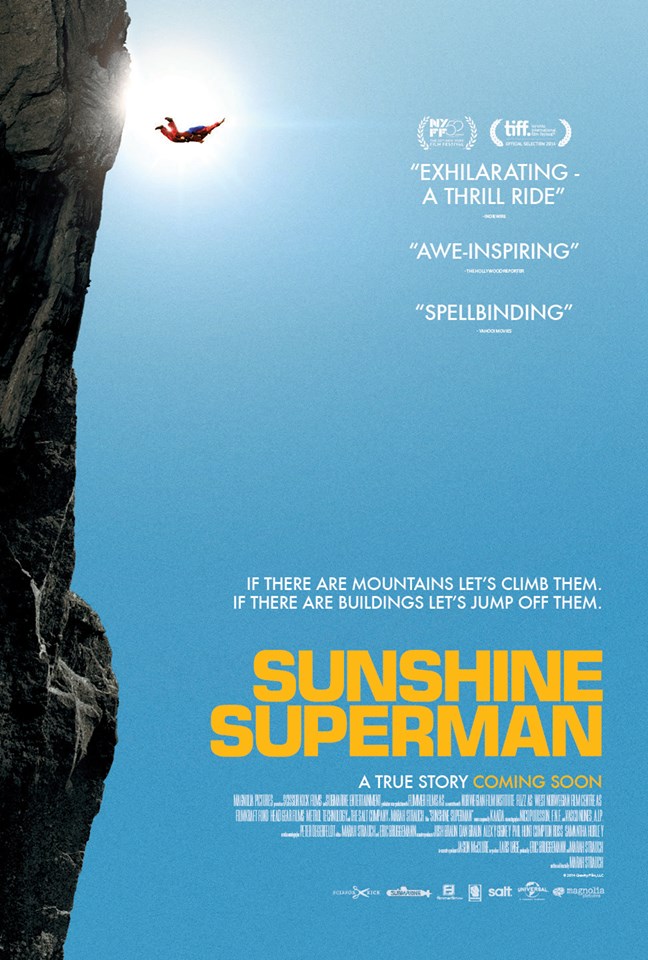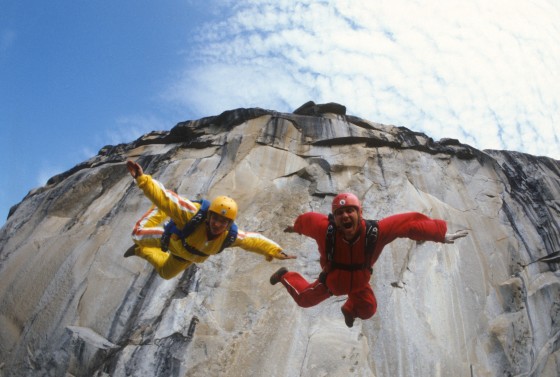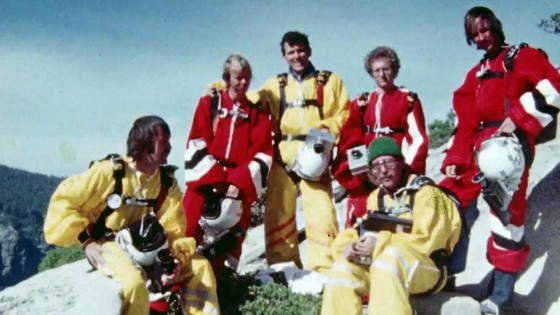BASE Jumping founder Carl Boenish may be one of the unsung filmmakers of his time. Before his death in the early ‘80s, he shot extraordinary footage of himself and others parachuting off of cliffs and tall buildings, which provide some of the few interesting moments in the new documentary Sunshine Superman, playing now at the Tivoli in Kansas City.
Boenish shot adrenaline-pumping POV shots during many of his free-falls with a camera attached to his helmet. He constructed an unsafe looking camera rig from a long, flimsy pole, with a bicycle seat attached to its end, which he suspended perilously from a cliff to film others jumping towards him off of a mountain.
As a filmmaker and a skydiver, Boenish was fearless. He is shown in archival footage at the beginning of the film, saying that he is first and foremost a filmmaker. However, Sunshine Superman makes the mistake of taking the emphasis away from Boenish’s exciting, envelope-pushing film work to tell a story that doesn’t celebrate his cinematic risk-taking, or convey the excitement of his skydiving stunts.
Boenish’s own visceral 16mm footage provides more visually interesting moments than the stolid scenes shot by Sunshine director Marah Strauch, and the documentary often uses the talking-heads format, one of the least cinematic devices a film could employ, to interview people who knew Boenish. Boenish’s wife, various friends, and jumping partners, speak fondly of a man who was a true eccentric, a kind of nerdy rebel with a knack for setting up beautiful shots, a defiant breaker of building codes and trespassing laws, and inventor of odd-looking cinematic apparatuses, who was addicted to the rush of skydiving. We get a sense of the excitement that BASE Jumping can induce through the few snippets of his footage that the film shows, but most of this excitement is only spoken about in Strauch’s footage.
Beyond his plain looks and shy demeanor, Boenish was a man driven by an unspoken urge to put his life in danger for the sake of temporary thrills, but Sunshine Superman doesn’t seem interested in talking about what drove him to jump. Nor does it explore the reasons people seeks thrills in life-threatening situations. The film is frustratingly imbalanced in its use of present-day interviews, archival news footage, home movies, and the underutilized glimpses of Boenish’s footage.
Regardless, Sunshine Superman is affectionate towards Boenish, and romanticizes his life as a kind of bookish thrill-seeker. Boenish’s marriage to his wife Jean is the emotional center of the film, but we are still left with only the smallest glimpses into his private life. We get the facile details of his marriage and the history of BASE Jumping itself, which are two aspects of the film that seem to slow down it’s pacing.
Sunshine Superman plays more like a light-hearted eulogy, and it doesn’t try very hard to dig deeply into Boenish’s life and ask what drove him to perform the stunts that eventually led to his death. But even worse, his natural artistic tendencies are almost entirely overlooked. In order to pay true respect to an obsessive man like Boenish, we would be better left with a film that consisted only of the death-defying footage he shot.
If editor Eric Bruggemann simply spliced together scenes shot by Boenish, we would understand the indelibly unique mark that he left on this world better than Strauch attempted to convey. Sunshine Superman is a very dull film about a man who lived dangerously.










Comments on this entry are closed.